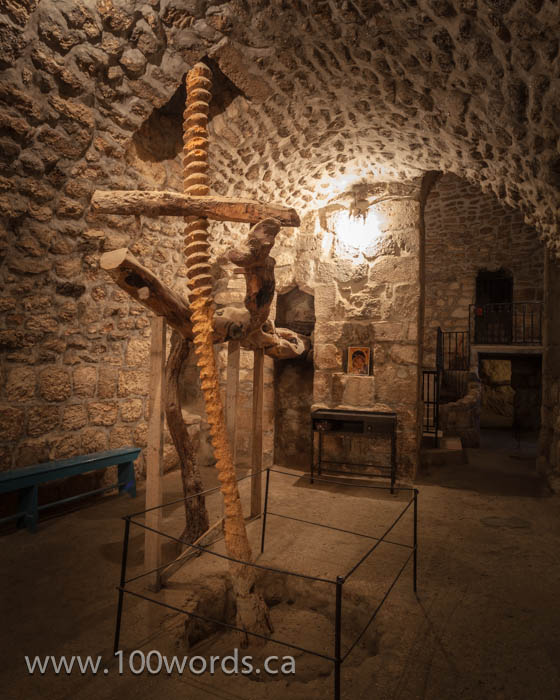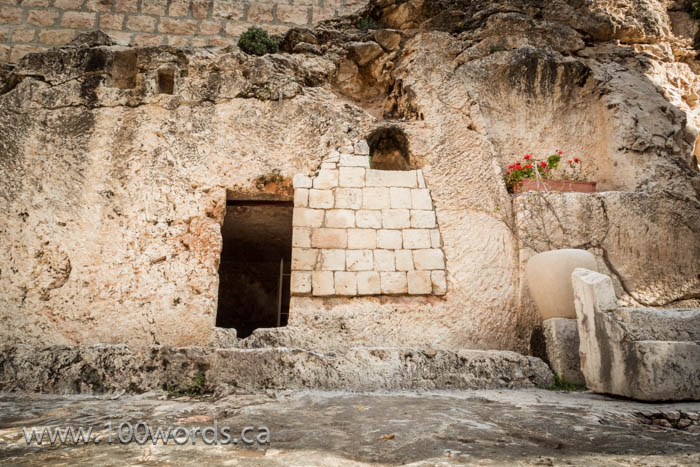“FOLLOW ME”
Click scripture link to read online or HERE to listen online (then click the symbol of the audio speaker above the scripture portion).

Near Tabgha Beach, on the shore of the Sea of Galilee, stands the Church of the Primacy of St. Peter. This square building of black basalt, built in 1934, is where Jesus is believed to have made a third appearance to His disciples after His Resurrection. As the event is described in the 21st chapter of John’s Gospel, Peter and six other disciples had been fishing all night without catching anything. Just after daybreak, Jesus stood on the beach, though they did not recognize Him. Jesus told the disciples to cast their net on the right side of the boat, and the net filled with 153 fish. When the disciples dragged the net ashore, they found that Jesus had cooked them breakfast on a charcoal fire. This church is built upon a rock believed to be the place where Jesus prepared breakfast for His disciples (see photo below).
GOOGLE MAPS – To see where the photo was taken, click HERE.
Key Verses: John 21:18b,19
You will stretch out your hands, and another will gird you and carry you where you do not wish. This He [Jesus] spoke, signifying by what death he [Peter] would glorify God. And when He (Jesus) had spoken this, He said to him [Peter], “Follow Me.”
John mentions Peter five times in the final words of his Gospel, and refers to himself only as “the disciple whom Jesus loved.” By the time John wrote these words, Peter had indeed stretched out his hands, and like Jesus’ hands, they were nailed to a cross. Early Church history tells us that Peter was executed by crucifixion in the city of Rome. John was there at Jesus’ death. He was the first of the Apostles to reach the empty tomb of Jesus, but he stepped back and let Peter enter first. No doubt John was also there in the High Priest’s courtyard and heard Peter deny that he knew Jesus three times. Now John sets the scene, mentioning that Jesus had fish on a charcoal fire (the only other charcoal fire mentioned in Scripture was there where Peter denied Jesus just a few days earlier). Now John writes of Jesus asking Peter three times, “Do you love Me?” Most likely, as a teenager, John, perhaps 15 years younger than Peter, fished Galilee in a boat next to Peter’s boat. Now he focuses on Peter’s total transformation. John was there when he heard Jesus call Peter, saying to him, “Follow Me!” Now he hears Jesus say again to Peter, “Follow Me!”
Jesus said, “My sheep know My voice, and I know them, and they follow Me!” Jesus says to each one of us, “Follow Me! Follow Me!” (read John 10:1-30). It may have been three weeks later that Peter, filled now with the Holy Spirit, preached the Good News of Jesus to Jewish people who had come from all over the world to Jerusalem to celebrate the Feast of Pentecost, and 3,000 believed in Jesus as their Saviour and Lord (Acts 2:14-24). Some months later, Peter was the first to bring the message of Jesus to non-Jews, starting with the Roman army officer, Cornelius, who believed in Jesus, along with his family members and neighbours (Acts 10:34-48).
PRAYER FOR TODAY:
O Lord God, like Peter, I need to listen to You! I need to follow You so very very closely. I pray for grace to love You more, much more, than fishing for fish or any other legitimate human pursuit. Whatever hours, days, months or years I have to live, may I help feed Your sheep and Your lambs. May I be faithful to give the life-giving eternal food of Your Word to everyone I meet, adults and children. I make a new commitment to You, Lord Jesus, here and now, to FOLLOW YOU more closely than ever!!! Amen!!!
100 PERSONAL WORDS:
Tomorrow, God willing, we re-start our two-year journey through the Bible once again. Are you with me? A much better question is, are you with Jesus? If you are not sure, start over again with a decision to make a lifetime commitment to Him! Call a Crossroads/100 Huntley Street prayer partner, and have them record your decision. Call toll free, 1-866-273-4444. Ask that caring person who answers to send you literature which will confirm your faith in Jesus. The only way to know what Jesus thinks is to read His Word. God’s Word expresses His thoughts. I know of no other way to get God’s thoughts to be my thoughts so I can do His will at all times. John wrote about his reason for writing portions of God’s Holy Word…”These things we write to you that your joy may be full!” (read 1 John 1:1-7). Today is the anniversary of the first Crossroads telecast on which I had the great honour of sharing the Good News of Jesus, June 2nd, 1962, at 11:30 p.m. And on June 3rd, 2012, is when my first blog was posted in this two-year journey through the Bible.
Please, please come with me once again. Walk with me through the pages of God’s message to His human family… and please share this 2-year opportunity with your friends and family! Also, watch for my two-minute “VLOG” (video blog) of each day’s readings on the Crossroads streaming platform “Castle” (HERE is the link).
Yours for commitment, consistency, and consecration to our Lord and Saviour, Jesus Christ!
David
Thank You, Father God, for the call to do this blog, and for health and strength to keep it going. Thank you to all others who have helped me do this. I could not have succeeded without you!

The rock, which is incorporated into the floor of the Church of the Primacy of St. Peter, is traditionally believed to be the place where Jesus prepared breakfast for His disciples. It was known to medieval pilgrims as Mensa Christ (the table of Christ).

On the shore of the Sea of Galilee, a statue depicts Jesus after His death and Resurrection, appearing before Peter. He asked Peter three times, “Do you love Me?…feed My sheep” (John 21 15-17).














